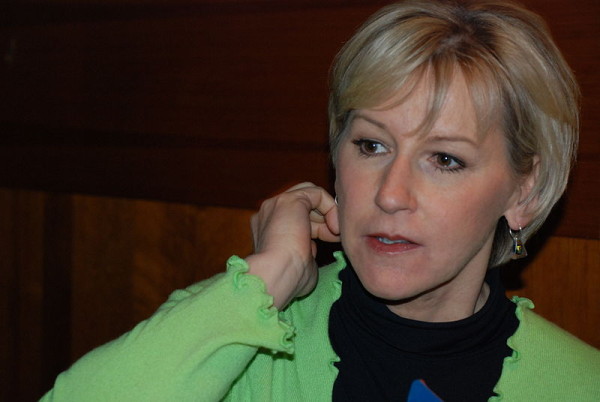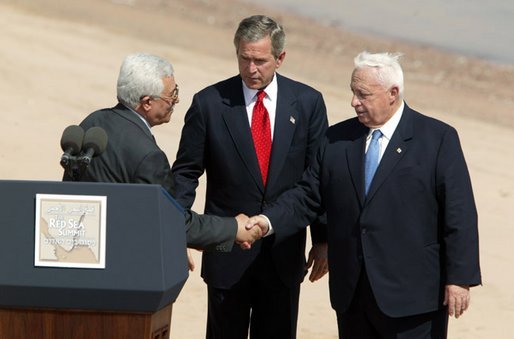Israeli Foreign Minister Avigdor Liberman has not exactly forged a reputation as a pragmatist, yet he recently called for a “pragmatic approach” to deal with the simmering Palestinian problem.
“I wish pragmatism dominated the political discourse in Israeli society,” he said the other day. “We are torn between … pragmatism and fanaticism.”
Calling on Israel to seize the diplomatic initiative before it is forced to do so by international pressure, he added, “We have to come up with policy recommendations. We cannot be constantly saying no, no, no.”
Nearly three weeks before unburdening himself of these sensible observations, Liberman acknowleded that territorial compromise will be required to reach an agreement with the Palestinians. As he said, “The nation of Israel is more important than the land of Israel.”
On the basis of these sober and refreshing comments, one might assume that Liberman, long associated with Israel’s hawkish camp, has suddenly sprouted wings and become a chirping dove.

Nothing could be further from the truth, judging by the peace plan he recently posted on the website of the political party he leads, Yisrael Beytenu, and his stated intention to boycott the forthcoming visit to Israel of Sweden’s foreign minister.
Regurgitating a proposal he has repeatedly raised over the past few years, Liberman said he would cede the Little Triangle area in northern Israel — inhabited mainly by Israeli Arabs — to a Palestinian state in exchange for territorial concessions in the West Bank.
Through a program of economic incentives, he would also encourage Israeli Arabs alienated from Israel to settle in the new state of Palestine. “Those who decide they identify as Palestinian could give up their Israeli citizenship and become citizens of a future Palestinian state,” he said.
Whatever the pragmatic merits of Liberman’s population transfer scheme may be, one can rest assured that the Palestinian Authority and the vast majority of Israeli Arabs will oppose it vociferously.
The Palestinian Authority leadership has made it abundantly clear it has no interest in acquiring the Little Triangle in exchange for ceding chunks of the West Bank, where a Palestinian state would arise and where Liberman and his family reside.
To most Arabs in Israel, Liberman’s plan is patently self-serving — stinking of racism and smacking of a thinly-veiled attempt by right-wing Israeli nationalists to reduce the Arab minority, currently 20 percent of Israel’s population, to manageable proportions.
Israeli Arabs, the descendants of Palestinians, are second-class citizens in many respects, but given the history of Palestinian dispossession since 1948, they most likely would not be seduced by financial incentives to voluntarily leave their homes and lands, as Liberman supposes. Liberman fancies himself as a realist, yet he cannot grasp these fundamentals. How realistic and pragmatic is that?
Which brings me to Margot Wallstrom, the Swedish foreign minister who’s expected to visit Israel in January, according to Channel 2.
Liberman will supposedly shun Wallstrom because her government was the first in Europe, back in October, to recognize a future Palestinian state, a principled position that emboldened yet more European nations to follow suit.

Does Liberman — an avowed advocate of a “viable Palestinian state” — really believe that boycotting Wallstrom will stem the tide of Palestinian nationalism and improve Israel’s diplomatic position? Is this his definition of pragmatism? He surely realizes that there is a global consensus on the need for a Palestinian state, and he surely understands that every major power supports a two-state solution.
Under these circumstances, Liberman would be prudent to engage Wallstrom and thus keep the lines of communication open between Israel and Sweden, a friendly country.
Is Liberman suggesting he will henceforth boycott foreign ministers with whom he disagrees? If that’s the case, he should immediately resign, given the fact that virtually every member of the United Nations backs the concept of Palestinian sovereignty and independence, an idea whose time has come.
So, contrary to his self-image, Liberman is no pragmatist. His record confirms that. He opposed Israel’s unilateral pullout from the Gaza Strip in 2005. In 2007, he lashed out at Ehud Olmert’s decision to attend the Annapolis conference. Shortly afterward, he left the coalition government, citing his opposition to peace talks with the Palestinians. “Negotiations on the basis of land for peace are a critical mistake, and will destroy us,” he reportedly said.

In a tense meeting with the then U.S. secretary of state, Hillary Clinton, Liberman archly dismissed her plea for an end to Israel’s settlement expansion program in the West Bank.
Liberman has constantly denounced Mahmoud Abbas, the president of the Palestinian Authority and the most flexible mainstream Palestinian leader in years. Shimon Peres, Israel’s former president, has described Abbas as a “serious leader who wants peace and is working to prevent violence and extremism in our area.”
Liberman, however, has accused Abbas of engaging in “diplomatic terrorism,” taken issue with the widespread appraisal that he’s a man of peace and claimed that he is not a suitable negotiating partner. Very interesting. This is the same person who once recommended that Israel bomb the Aswan dam in retaliation for Egypt’s support of Yasser Arafat.
It clear, to me at least, that Liberman is as pragmatic as Bashar el-Assad is democratic. Israel desperately needs a foreign minister who fully understands the complexities of the Middle East, accepts reality and is pragmatically capable of changing with the times.
This piece appeared in the Times of Israel.
